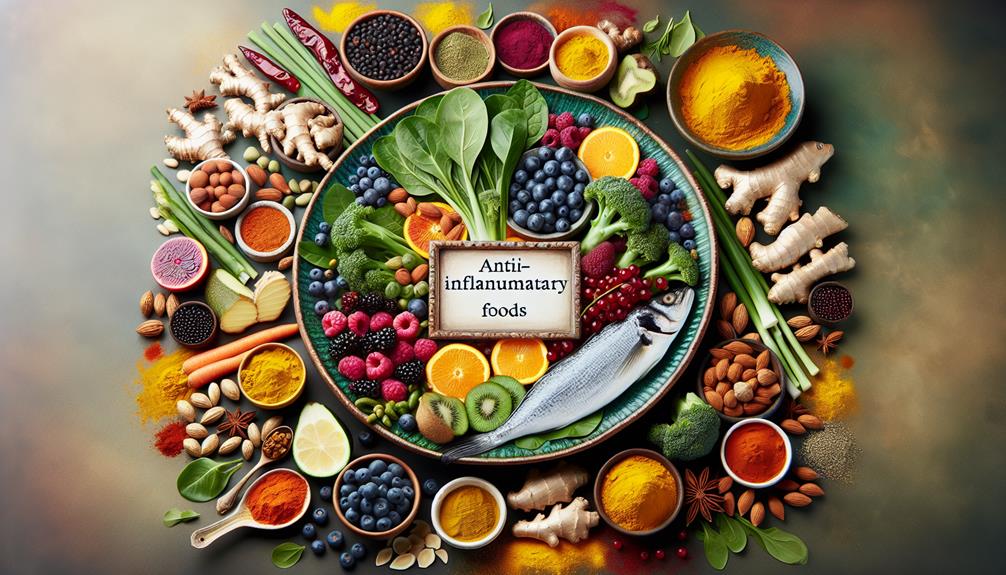If you've ever winced when climbing stairs or felt discomfort after a long walk, you know how joint pain can put a damper on your day. But what if the key to easing those aches and pains was right in your kitchen? By making simple tweaks to your diet, you can nourish your joints from within and potentially find relief from the discomfort that hinders your daily activities. Let's explore how the foods you eat can play a crucial role in supporting strong and healthy joints.
Key Takeaways
- Essential nutrients like vitamin D, calcium, and omega-3 fatty acids support joint health.
- Consuming foods like salmon, berries, leafy greens, nuts, and seeds promotes strong joints.
- Supplements such as glucosamine, chondroitin, and omega-3 fatty acids aid in joint support.
- Proper hydration and an anti-inflammatory diet play crucial roles in reducing joint aches and pains.
Importance of Nutrients for Joint Health
To maintain strong and healthy joints, ensuring adequate intake of essential nutrients is crucial. Proper nutrition plays a vital role in supporting joint health, especially when combined with an appropriate exercise regimen and weight management. Nutrients like vitamin D, calcium, and omega-3 fatty acids are essential for maintaining strong bones, which are the foundation of healthy joints.
Vitamin D is crucial for calcium absorption, which is necessary for bone strength. Incorporating foods rich in vitamin D, such as fatty fish and fortified dairy products, can help support your joint health. Calcium, found in dairy products, leafy greens, and fortified foods, is essential for maintaining bone density and strength. Omega-3 fatty acids, commonly found in fish like salmon and mackerel, have anti-inflammatory properties that can help reduce joint pain and stiffness.
Best Foods for Strong Joints
Ensuring a diet rich in specific nutrients is essential for promoting strong joints and overall joint health. When it comes to maintaining strong joints, incorporating certain foods into your diet can make a significant difference. Here are some joint-friendly options to consider:
- Salmon: Packed with omega-3 fatty acids, salmon helps reduce inflammation in the body, potentially easing joint pain.
- Berries: Blueberries, strawberries, and raspberries are rich in antioxidants that can help protect joints from damage.
- Leafy greens: Spinach, kale, and other leafy greens are excellent sources of vitamins and minerals essential for joint health.
- Nuts and seeds: Almonds, walnuts, chia seeds, and flaxseeds provide omega-3 fatty acids and other nutrients that support joint function.
Incorporating these foods into your meals can help support your joint health and reduce the risk of aches and pains. For joint boosting recipes and joint-friendly snacks, consider trying out dishes that include these ingredients for a delicious and nutritious way to support your joints.
Supplements for Joint Support

For additional support in maintaining strong joints, consider incorporating supplements known to promote joint health and mobility. While a balanced diet rich in nutrients is crucial, some individuals may benefit from additional support through supplements. Here are some key supplements that are commonly used for joint health:
| Supplement | Function | Recommended Dosage |
|---|---|---|
| Glucosamine | Supports cartilage | 1500 mg daily |
| Chondroitin | Helps maintain joint integrity | 800-1200 mg daily |
| Omega-3 fatty acids | Reduce inflammation | 250-500 mg EPA and DHA combined daily |
In addition to supplements, incorporating alternative therapies, exercise routines, lifestyle changes, and dietary adjustments can significantly impact joint health. These approaches work synergistically with supplements to provide comprehensive support for your joints. Remember to consult with a healthcare provider before starting any new supplement regimen, especially if you have existing health conditions or are taking medications. By combining these strategies, you can enhance joint health and reduce aches and pains effectively.
Hydration's Role in Joint Health
Staying adequately hydrated is essential for maintaining optimal joint health and function. Proper hydration helps in cushioning the joints, maintaining the cartilage structure, and ensuring the smooth movement of the joints. Here are some key points to consider regarding hydration and joint health:
- Electrolyte balance: Electrolytes like sodium, potassium, and magnesium play a crucial role in maintaining proper fluid balance within the joint spaces, aiding in nutrient transport and waste removal.
- Healthy fluids: Consuming water, herbal teas, and natural fruit juices can contribute to your daily fluid intake, supporting joint lubrication and overall function.
- Avoid excessive caffeine and alcohol: These substances can lead to dehydration, impacting joint health and potentially exacerbating joint pain.
- Monitor your hydration: Pay attention to your body's thirst signals and aim to drink fluids consistently throughout the day to support joint health and overall well-being.
Anti-Inflammatory Diet for Joint Pain

Maintaining an anti-inflammatory diet can play a significant role in managing joint pain and promoting overall joint health. When focusing on an anti-inflammatory diet to alleviate joint pain, meal planning becomes crucial. Incorporating foods rich in omega-3 fatty acids like salmon, walnuts, and flaxseeds can help reduce inflammation in the body. Additionally, colorful fruits and vegetables such as berries, cherries, spinach, and kale are packed with antioxidants that combat inflammation.
Cooking techniques also play a vital role in preserving the anti-inflammatory properties of foods. Opt for methods like steaming, baking, or sautéing with healthy oils like olive or avocado oil to retain the nutrients that support joint health. Avoid deep-frying or charring foods, as this can lead to the formation of harmful compounds that may worsen inflammation.
Frequently Asked Questions
Can Certain Cooking Methods Affect the Nutrient Content of Foods That Promote Joint Health?
When it comes to cooking methods affecting nutrient content, steaming is gentler than grilling, helping retain more nutrients. Similarly, blanching is milder compared to roasting, preserving essential nutrients in foods that promote joint health.
How Does Stress Impact Joint Health and What Can Be Done to Mitigate Its Effects?
To support joint health, managing stress is crucial. Implement relaxation techniques like deep breathing or yoga. Mind-body connection through mindfulness practices can alleviate stress. Prioritize self-care to reduce the impact of stress on your joints.
Are There Any Specific Exercises or Stretches That Can Help Improve Joint Flexibility and Reduce Pain?
To boost joint flexibility and reduce pain, try incorporating yoga poses or strength training exercises into your routine. Enhance joint mobility with targeted stretches and foam rolling techniques. Consistent practice can lead to improved comfort and mobility.
Is There a Recommended Daily Intake of Water for Optimal Joint Health?
To maintain optimal joint function, it's vital to stay hydrated. Adequate water intake supports hydration levels, which are crucial for keeping joints lubricated and functioning well. Drink plenty of water daily to support your joint health.
How Does Sleep Quality and Quantity Influence Joint Health and Inflammation Levels?
Improving sleep habits positively impacts inflammation levels and joint health. Consistent rest supports tissue repair and reduces inflammatory markers. Quality sleep aids in managing pain and promotes overall joint function. Prioritize good sleep patterns for healthier joints.
Conclusion
In conclusion, taking care of your joints through proper nutrition is key to reducing aches and pains. Remember, you are what you eat, so choose foods that support joint health and consider incorporating supplements if needed. Stay hydrated, follow an anti-inflammatory diet, and your joints will thank you in the long run. Remember, "prevention is better than cure," so make your joint health a priority starting today.













